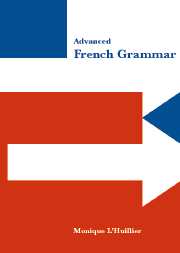Book contents
- Frontmatter
- Contents
- Acknowledgements
- Introduction
- 1 Framework
- 2 Verbs
- 4 Introduction to verbs
- 5 Present indicative
- 6 depuis and other tense markers
- 7 Future
- 8 Imperfect
- 9 Perfect
- 10 Past historic
- 11 Other past tenses
- 12 Subjunctive
- 13 Conditional and the expression of hypothesis
- 14 Imperative
- 15 Infinitive
- 16 Present participle
- 17 Past participle
- 18 Active and passive voices
- 19 Impersonal verbs and the impersonal voice
- 20 Pronominal verbs
- 21 Modals: devoir, pouvoir, vouloir
- 22 savoir and connaître
- 3 Determiners and prepositions
- 4 Nouns, pronouns and modifiers
- 5 Sentences and text
- Appendixes
- Bibliography
- Index
22 - savoir and connaître
Published online by Cambridge University Press: 05 June 2012
- Frontmatter
- Contents
- Acknowledgements
- Introduction
- 1 Framework
- 2 Verbs
- 4 Introduction to verbs
- 5 Present indicative
- 6 depuis and other tense markers
- 7 Future
- 8 Imperfect
- 9 Perfect
- 10 Past historic
- 11 Other past tenses
- 12 Subjunctive
- 13 Conditional and the expression of hypothesis
- 14 Imperative
- 15 Infinitive
- 16 Present participle
- 17 Past participle
- 18 Active and passive voices
- 19 Impersonal verbs and the impersonal voice
- 20 Pronominal verbs
- 21 Modals: devoir, pouvoir, vouloir
- 22 savoir and connaître
- 3 Determiners and prepositions
- 4 Nouns, pronouns and modifiers
- 5 Sentences and text
- Appendixes
- Bibliography
- Index
Summary
Introduction
The choice between savoir and connaître can pose problems for the Englishspeaking learner since both verbs mean ‘to know’. In order to solve these problems, it is necessary to take the following into consideration:
– subject and object restrictions
– syntactic restrictions.
It is also important to know how to distinguish between the uses of the perfect (or past historic) and the imperfect according to their meanings.
The basic distinction between the meanings of savoir and connaître may be presented as follows:
– savoir is used to denote knowledge of facts and skills gained through tuition and practice
– connaître is used to denote knowledge of facts gained through experience, and knowledge of people through personal acquaintance.
NB: This is only a general distinction which does not account for various additions and exceptions which are explained below.
savoir
Constructions with savoir include the following features:
– the subject is always personal
– the object is always non-personal
– savoir is followed by a subordinate clause
Therefore savoir (and notconnaître) must be used in the following cases:
(i) savoir + que-clause
If there is a subordinate clause introduced by que, savoirmust be used.
Ex: Je sais qu'il ne veut pas y aller.
I know he does not want to go there.
Je ne savais pas que vous aviez terminé.
I did not know you had finished.
NB: ne pas savoir + que is impossible in the present tense with je.
- Type
- Chapter
- Information
- Advanced French Grammar , pp. 293 - 300Publisher: Cambridge University PressPrint publication year: 1999



